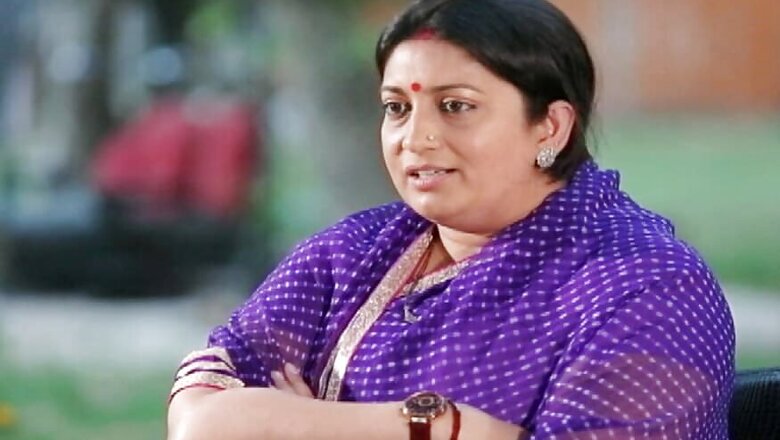
views
She started the journey from Delhi to Mumbai - in her own words - with a bag full of nothing and came back a Cabinet minister.
Two years into her job as Union Human Resources Minister, Smriti Irani is a lightning rod for controversy. She has been under relentless attack in Parliament and in social media over several issues, including the JNU sedition row and Rohith Vemula suicide.
Here in an interview to CNN-News18 Resident Editor Vir Sanghvi, Smriti Irani explains how she takes it all in her stride and hits back as hard as she gets. "I think it's fashionable if you're right-wing and a woman, you get abused," she says.
Here is the full transcript of the interview:
Vir: Now the story is that you were quite rebellious and you wanted to get out of home and one of the things you wanted to do bizarrely in retrospect, enter the Miss India contest. Is that correct?
Smriti: That was for me an opening into a world...that did not control my destiny...for me I led a whole life which was sheltered where others determined my destiny.
For a change, I wanted to step out and do something of my own. That was one opening that took me to another world, my parents knew they had no control over.
Vir: Your father apparently refused to pay for any of the money you required?
Smriti: It was not looked upon as a very traditionally respectable arena of work and for him it was quite a shock. My parents predominantly felt that you had the academic inclination. They thought I will give UPSC exams, became a top notch IPS or an IAS officer, why would you choose glamorous profession where women are not looked at or given any kind of respect. So my father said, "Bewkoof hote toh samajh bhi ata lekin akal hai toh kyu jana chahte ho is field me?" (I'd have understood if you were dumb but despite having brains, you want to get into this field) But, I was quite adamant.
Vir: Apparently, correct me if I am wrong, because your family wouldn't pay for this and it required quite a lot of money to prepare for this contest, you took loans, borrowed the money?
Smriti: Yes, I did. It was a solemn promise that I will pay back.
Vir: You did okay in the contest but you were eliminated before the Q&A round, which is probably, in retrospective, relief for the judges. What do you remember?
Smriti: I remember that I kept saying this to myself backstage, let me get into the Q&A round, I'll beat it and take the crown.
Vir: So, you were like the nerd among the beauty queens?
Smriti: I was the nerd and still am.
Vir: You're still a nerd?
Smriti: Still a nerd.
Vir: Apparently, when you paid back the money and your parents still refused to, you went out?
Smriti: Predominantly, my dad and mom had come to terms with the fact that I have carved out a niche for myself and I was adamant about it. My dad was continuously hopeful that I will fail and come back.
Vir: It's because you didn't agree to all of this and he wouldn't give you money to pay back the loan, you went and did a series of things including working at McDonalds. Is that story true?
Smriti: I did. I had no money and was fast running out and I couldn't borrow more and I remember seeing two advertisements side by side. One for Jet Airways cabin crew and other was for McDonalds. I was very fascinated and went in but they (Jet) rejected me.
So, I hopped on to the next interview slot at McDonalds. Unfortunately, by the time I reached for that interview, all the top positions were decided upon and I asked if there were any jobs left. They said we have jobs but that will involve swiping the floors or cleaning the dishes and the next level would be to get to the cashier. So I said I'll take it as I had no money.
One month into the job, I got a call from Ekta Kapoor but that one month was quite gruelling. So, now everytime I go to the McDonalds, I have a huge smile on my face because I know how tough it is behind the counter.
Vir: The success of the Tulsi character that you played made you a household name within weeks. Isn't it? Was that transition difficult?
Smriti: I was so engrossed in our work and working in a studio set-up. Most of us never made it home till only the wee hours in the morning. So engrossed in my work, taking the character from one. Ekta and my husband, both at work and home kept me so grounded that it never hit me that it is such a huge TV success.
Vir: You had a miscarriage in a public place and nobody bothered to help? You took a rickshaw and went to the hospital? That's true right?
Smriti: It's true. That still happens, my mother got operated last week and I wanted to see her post operation. All the guys wanted a picture, I said I want to talk to my mother first.
Vir: That doesn't bother you?
Smriti: Bothers me. It does, but I can't cry over it. It's a part and parcel of my life.
Vir: When you joined politics, there were some controversies you now regret. For instance, you made a remark on Narendra Modi, where you later changed your mind. How did that kind of thing affect you? Why did you do it and change them when you had just joined politics?
Smriti: I think in life, in retrospect, I hold no grudges, I hold no regrets. It also takes a lot to publicly stand up and say that I made a mistake, not many politicians in our country have done that. I don't recall many publicly making that acknowledgement.
Vir: How long did it take you to realise you made that mistake?
Smriti: I had a chat, and I think what I credit Mr Modi with, is his conversation was on elements which were discussable, debatable and he gave me that much of respect to hear what I had to say.
Vir: After you had asked him to resign?
Smriti: Yes. And he gave me that respect and I think my respect for him grew manifold.
Vir: Did you know him before that?
Smriti: I had not known him.
Vir: So, the first time you met him was after you had publicly gone on TV demanding his resignation?
Smriti: I had known him through the paper cuttings about him and I think that is what he brought into the discussion. There is more to his work than the op-ed pieces that were written denouncing him. And to his credit, he was magnanimous enough to sit down with somebody who had publicly sought to disgrace him and say this is what I do, judge me on what I do and I did I had a lot of respect for the fact that he was the then chief minister and I had just started in politics. He could have very well had me brushed aside he could've told my organisation to have me sacked and thrown out but he did none of that.
Vir: Why do you attract so much criticism, why are you such a lightning rod for controversy?
Smriti: I think that the idea is to take it in your stride. I think at that moment when things are tough when it's really bearing down on you. There are times when I stand up and ask myself why go through all this? But, then I remember that there are people gleefully waiting behind the scenes, waiting for me to give up.
Vir: Recently?
Smriti: I think it's fashionable if you're right-wing and a woman, you get abused everyday. It's just that you don't get an opportunity to play much martyr about it. So that happens everyday. It happens in your office. It happens online and it happens everywhere.
Vir: The abuse gets to you?
Smriti: There are times when it gets to me. I am being honest because it will be inhuman if I say nothing gets to me. There are times when it gets to me.
Vir: What kind of abuse gets to you? What kind of things really hurt you? Do you come back home feeling beaten by the end of the day?
Smriti: There are times when you are beaten and I think any working professional is beaten. The idea is that your home is that place where you are secured enough to say I am beaten but I need to get back up.
Vir: Do you check Twitter?
Smriti: I have been told at times, especially when the snide remark comes from journalists, that now you are a Cabinet minister, you are not supposed to respond. I do respond. I engage with everybody. I think there is an ecosystem that has developed where some believe that it is their birthright to be snide. Others believe it's their birthright to be opinionated, but would not want the same behaviour thrust upon them. So, for me, if you are ready to assault, then be ready to be hit back.
Vir: When the elections were called, you were sent to Amethi to fight against Rahul Gandhi. Many people saw this like the decision to field you against Kapil Sibal in Delhi and they thought you were used as a suicide bomber. Did you see it that way?
Smriti: I think I looked at it as an opportunity to apply the political skills that I have learnt in terms of organisation. This time around who organised every meetings, organised ceremonies to give respect to the booth leaders. So because I was looking at micro-managing every detail. I was told I was going into a Gandhi bastion where the maximum BJP got was 30,000 votes, and you have only 20 days, and they said it is an impossibility. Best you can do is possibly get 60 thousand or one lakh votes. There were people who thought "yeh toh apna kagaz bharkar chali jayengi and wapas baad me ayengi (she will come, file her nomination and return later). Never in their lives did they imagine that I would stay.
Vir: Will you stand for Amethi next time?
Smriti: I have never projected my liking or desire to my organisation. Didn't do it then, not doing it now.
Vir: Will you ever project your dislike to your organisation?
Smriti: You have to recognise, irrespective of the Cabinet minister you sit with, the other star you have met with many years ago, I am still that kid who came out of that tabela (shed) in Munirka. I always remember that I am still that kid who swept floors at McDonalds and I never forget that. Everything else that happens in my life is a bonus.
Vir: Did you expect to become a Cabinet minister? Where were you?
Smriti: I was not even in Delhi. I was in Shimla. I was trying to shoot a film which I had left midway because of my political commitment with Rishi Kapoor and Abhishek Bachchan and we had another female co-star with us. I was merrily shooting and I got a call - 'Where are you' and I said Shimla and they said aren't you coming. I said I'll reach by evening to see the shapath (oath ceremony). They said you don't have to see the shapath (oath ceremony) you have to take shapath, please come down and we literally raced down from Shimla to Delhi by road and by the time I had got home, reporters were standing outside.
Vir: Did you expect this portfolio?
Smriti: I remember calling one of my colleagues, Piyush Goyal, and I said Piyush Bhai, mujhe ek extra pass milega (can I get an extra pass) and he says why, and I said I want to bring my daughter along. He said please take two passes, you are getting a Cabinet rank.
Vir: You really had no clue? And HRD was also no clue?
Smriti: I never expressed the desire to become a minister, let alone HRD minister.
Vir: If you remember, when you were announced the HRD minister, you had faced criticism suggesting that you were not educated enough. You are not intellectual enough for the job. How did you react to that?
Smriti: I didn't. I think that it was a fear that was well-founded because nobody had seen my work or neither did I have any public experience in the field of education, so for me to say, they were a bit unfair to me would be an unfair judgement or observation. To be fair to everybody who was critical, they were right in having a fear that she has no experience, let alone the uneducated aspect. I mean that's fine but the 'not having the experience bit' was more scary for those who had been leaders of the particular sector, so I don't hold that back against them.
Vir: What about the fact that they called you 'anpadh'?
Smriti: Anpadh hokar yaha pohuch gaye, padh likh lete toh kya hota. (Being an illiterate, I reached here, imagine if I was a literate). For me if anybody says, arey anpadh (illiterate) or whatever, that time I just have a big smile on my face, which means their education has not percolated enough into
their souls to be not judgemental about other human beings.
Vir: So what was the fuss about the degree?
Smriti: It is a sub-judice matter and I would rather not speak. Though I had a trigger happy anchor who wanted a new headline.
Vir: Do you hate it.
Smriti: I hate the consequences that my children faced.
Vir: What consequences did they face?
Smriti: Anpadh ke bacche (Children of illiterate), they would get that in school. I had to sit down with them and tell them that what other kids think of me is not me, what you think of me, is what matters to me.
Vir: After you've been elected, you've pretty much been a lightning rod for controversy after controversy, some would say you may be even the most controversial minister in this Cabinet?
Smriti: Possibly.
Vir: Has that surprised you?
Smriti: I am vehement in my defence. I never take stuff lying down and I guess there is traction to any statement that I make.
Vir: When you speak in Parliament on the Rohit Vemula issue, etc, there was a certain fire in your speeches and a certain personal edge to things you said. And your colleagues say, she shouldn't make that personal. How do you respond?
Smriti: It is personal.
Vir: Why is it personal?
Smriti: It is not about establishment. It is about me.
Vir: Well, if they are discussing, say a suicide of a student in Hyderabad, is it really about you?
Smriti: No, but if they do say that she is this and she is that, then it is about me.
Vir: Do you get angry?
Smriti: No, I think that day, it was an emotional outburst because I saw the opposition speak as they had spoken. Jyoti, who I had known for a very long time, and he was having his arms open and melodramatic about his speech. But because he did not have a background of an actor one would not have accused Jyoti of being over melodramatic . Because I was speaking from my gut, I would be accused of being outrageous. So that is one challenge I come with . And I had Jyoti's leader sit there and have this smirk on his face, a leader I had confronted with in Amethi.
Vir: This leader that you confronted in Amethi is like a quote phrase for Rahul Gandhi?
(Smriti laughs)
Vir: So, why do you get so emotional?
Smriti: Well, when Mr Scindia was speaking, he was being a bit melodramatic in his speech. He had his arms wide open and there was a rehearsed expression which was coming on. As a politician, you have to make a mark about whatever you are articulating. One of his leaders, and there are a few, had a smirk on his face.
Vir: There's only two leaders, man or woman?
Smriti: No, the lady has never been discourteous.
Vir: So, man? Alright. Rahul Gandhi?
Smriti: It's an insinuation (laughs). That smirk I think is what hit me. The fact, that for many it was just a political debate, but for me it was about two years of work. For me, it was about a young life and I found nothing funny about it and the fact that we could as politicians be so caught up in using it as a political opportunity. I think what agitated me and when I spoke, I spoke not as a politician. In fact, I looked like a rookie politician. I spoke as a human being and I think that is why it had such a huge connection with people across the country. I always have said and pleaded at times, don't make education a battlefield.
Vir: That's why?
Smriti: Yes. It was a plea not to make it a battlefield.
Vir: So you got emotional because you cared about the story? You were upset because they turned education into a battlefield and because you thought it was a serious issue and Rahul Gandhi was smirking. That's basically what you are saying?
Smriti: For me, politics is an arena which is still connected to the human need and the desire to be better as people, as individuals of the country. It is not about a legacy. I don't have any. For Mr Gandhi, it's about preserving a legacy and a party which has been in the country since the inception of democracy. For me it is a different ball game altogether. I don't look at people that I serve as votebanks that I need to appease. I have said it in a women's conference long back that a good leader takes you where you want to be but a female leader is somebody who takes you where you ought to be. And education is mired in many challenges.
Vir: The suggestion is, what you have actually done is you saffronised education. You have taken away the unbiased character of our history and you've added strongly Hindu elements?
Smriti: Not a single history book has been touched yet.
Vir: Yet, sounds very ominous?
Smriti: Like I said, if you mount a charge, it has to be substantiated with something.
Vir: So, you reject that criticism?
Smriti: Obviously, I have said it so many times that by now even the Opposition knows my answer.
Vir: Rohit Vemula we've dealt with, and there are many people who will say that what you said was inaccurate?
Smriti: I backed it with evidence. My evidence is not being challenged.
Vir: That leaves us with other incidents such as the JNU. You think the govt overreacted in the Kanhaiya case?
Smriti: I have never spoken about an individual student.
Vir: You don't think the government overreacted in the JNU matter?
Smriti: Law and order is not my domain. What is in my domain, I answer to only that.
Vir: That's a tactful response and that actually reveals a lot more.
Smriti: It's a very accurate response.
Vir: So, you will not comment on the law and order approach?
Smriti: I will not because it is sub-judice matter. My personal opinion as HRD will weigh in and it would be irresponsible for me to have a personal reflection about what I think of people who say 'Bharat ki barbadi tak jung ladenge' I feel very strongly about it. I said it in Parliament that you abuse my Constitution and my President, our President, but you seek his refuge. You abuse my Supreme Court, our Supreme Court, but you seek their refuge and I think the verdict in the bail application given by Pratibha Ji was very poignant. It said what every Indian wanted to say.
Vir: That was actually not my question. You are entitled to that view. I merely ask you whether the government response was out of proportion?
Smriti: Since it's a sub-judice matter and there is a government representation in the matter, anything I personally say would tilt the balance and I would not want that to happen.
Vir: You said to me once in an interview - from the times when I was young, I was determined to make something of myself and to go places. Obviously that hasn't changed. Obviously you are willing to let the party decide politically what your next assignment should be. But for Smriti Irani, where do you go from here?
Smriti: Right now, it is all about that if you look and turn back. I turn back without any regrets. I turn back with a huge smile on my face, because there are not many women who come from an absolutely challenging economic background, who go from Delhi to Mumbai all alone, with a bag full of nothing - and come back to Delhi a Cabinet minister.



















Comments
0 comment